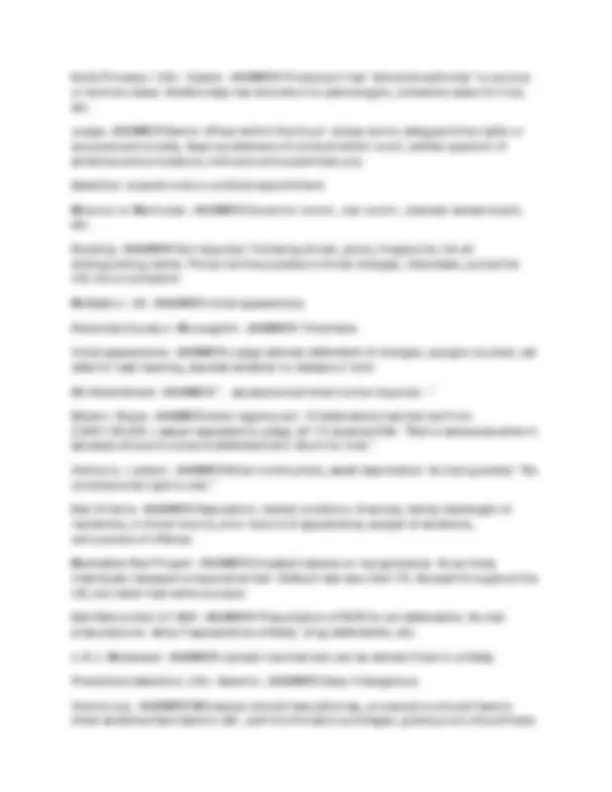







Study with the several resources on Docsity

Earn points by helping other students or get them with a premium plan


Prepare for your exams
Study with the several resources on Docsity

Earn points to download
Earn points by helping other students or get them with a premium plan
Community
Ask the community for help and clear up your study doubts
Discover the best universities in your country according to Docsity users
Free resources
Download our free guides on studying techniques, anxiety management strategies, and thesis advice from Docsity tutors
PA 241- EXAM #3 Questions And 100% Correct Answers
Typology: Exams
1 / 9

This page cannot be seen from the preview
Don't miss anything!






Dual Court System - ANSWER Federal and state courts
Trend toward federalization - ANSWER Carjacking, kidnapping, hate crimes. Tried to federalize all crimes with a gun in '98.
Three-Tiered System - ANSWER Trial courts of limited jurisdiction--> trail courts of general jurisdiction--> appellate courts
Original Jurisdiction - ANSWER The lawful authority of a court to hear or act on a case from its beginning and to pass judgment on the law and the facts. May be over a specific geographic area or over particular types of cases.
Appellate Jurisdiction - ANSWER The lawful authority of a court to review a decision made by a lower court.
Federal Judiciary Act of 1979 - ANSWER 3 Tier Model for Court System:
-Trial courts of limited jurisdiction
-Trial courts for general jurisdiction
-Appellate courts
State Court systems today - ANSWER -State courts vary, most use 3-tiered structure.
-The court reform movement continues today, seeking to simplify and unify court structures.
State Court: Limited jurisdiction or lower courts - ANSWER -JP, justice, district, police, municipal, etc.
-Family disputes, midemeanors, etc.
-Few attorneys practice here regularly.
-Most reforms target this level.
-May be beginning of process for felony.
-Why bother? Local control and revenue
State Court: General Jurisdiction/Trial/Felony courts - ANSWER -District, circuit, superior, supreme, etc.
-Felony and serious civil matters
-Courts of Record, basis for appeal
-Trial de novo jurisdiction in3/4 of states
-Judges required to be members of bar
-Adversarial, although plea bargaining predominates
Specialty Courts - ANSWER -Drug, gun, family, juvenile, etc.
-Restrictive area of authority
Appeals - ANSWER Requests by a defendant to a higher court asking it to review the actions of a lower court. Some cases, such as death penalty or life sentences, are automatically appealed. Most convictions are confirmed, some decisions are reversed and cases remanded. Recourse may be to a state supreme court.
Court of Last Resort - ANSWER State Supreme Court. Less than 20% of appeals are criminal. It is not uncommon for NY, FL to have 9k appeals/yr. Order new trials, free defendant, uphold verdict.
Appellate Courts - ANSWER Review decisions of trial courts and administrative agencies. Some states do not give this level original jurisdiction over appeals but they get Supreme overload.
Appeals: Moving to the Federal System - ANSWER Cases can be appealed to the US Supreme Court if they are based on a claimed violation of the defendant's rights as guaranteed under federal law or the US Constitution.
Herrera v. Collins (1993) - ANSWER Evidence of innocence is no reason for a federal court to order a new trial if constitutional grounds are lacking. "Where a defendant has been afforded a fair trial and convicted of the offense for which he was charged, the constitutional presumption of innocence disappears."
Article 3 of Constitution - ANSWER -Section 1: "One supreme court, and...inferior courts as Congress...may establish"
-Section 2: "such Courts have jurisdiction over federal laws, treaties, disputes between states, and in cases where one party is a state."
-Four tiers, w/ first administrative
Magistrate Court - ANSWER Misdemeanor cases, set bail, search warrants, review civil rights cases. Act of 1968 required judges to be bar members.
US District Courts - ANSWER trial courts of Fed. Judges appointed by President and confirmed by senate. Lifetime appointment. Original jurisdiction for federal laws, regulatory codes, civil rights violations.
Nolle Prosequi: US v. Cowen - ANSWER Prosecutor has "absolute authority" to pursue or dismiss cases. Additionally has discretion to plea bargain, schedule cases for trial, etc.
Judge - ANSWER Senior officer within the Court: duties are to safeguard the rights or accused and society. Appropriateness of conduct within court, settles question of evidence and procedure, instructs and supervises jury.
Selection: popular vote or political appointment
Missouri or Merit plan - ANSWER Governor comm., bar comm., elected review board, etc.
Booking - ANSWER Not required. Following arrest, photo, fingerprint, list all distinguishing marks. Police list the possible criminal charges, interviews, police file info into a complaint.
McNabb v. US - ANSWER Initial appearance
Riverside County v. McLaughlin - ANSWER Timeliness
Initial appearance - ANSWER Judge advises defendant of charges, assigns counsel, set date for next hearing, decides whether to release or hold.
8th Amendment - ANSWER "...excessive bail shall not be required..."
Stack v. Boyle - ANSWER alien registry act. 12 defendants had bail set from 2,500-100,000. Lawyer appealed to judge, all 12 received 50k. "Bail is excessive when it exceeds amount to ensure defendant will return for trial."
Carlson v. Landon - ANSWER Alien communists, await deportation. No bail granted. "No constitutional right to bail."
Bail Criteria - ANSWER Reputation, mental condition, finances, family ties/length of residence, criminal record, prior record of appearance, weight of evidence, seriousness of offense.
Manhattan Bail Project - ANSWER Created release on recognizance. 4x as many individuals released compared w/ bail. Default rate less than 1%. Spread throughout the US, but never had same success.
Bail Reform Act of 1984 - ANSWER Presumption of ROR for all defendants. No bail presumptions: deny if appearance unlikely: drug defendants, etc.
U.S. v. Motamedi - ANSWER Upheld rule that bail can be denied if bail is unlikely.
Preventive detention, US v. Salerno - ANSWER Deny if dangerous
Grand Jury - ANSWER Witnesses should have attorney, prosecutors should have to show evidence favorable to def., self-incrimination privileges, grand jurors should have
all info available to prosecutors.
Investigative GJ - ANSWER Examine general rather than specific criminal conduct. Presentment from this may be used to build a case against particular individuals.
Accusatory GJ - ANSWER Acts as community conscience to see if state info justifies a trial. Prosecution runs these proceedings, can prevent hearsay evidence, outcome: true bill or no bill.
Preliminary Hearing - ANSWER Mini-trial. Determine is probable cause exists, conducted before magistrate or limited judge. Prosecution presents minimal evidence and witnesses necessary to make prob. cause, can present hearsay evidence. Defense able to cross and refute. The judge determines whether def. is bound over for trial (same as indictment) and prosecutor's info is filed with General jurisdiction court. The defendant can waive prelim.
Arraignment - ANSWER Judge informs defendant of charges found in indictment, Grand Jury or Preliminary.
Pleas: Guilty - ANSWER Admits charges and surrenders constitutional rights.
Pleas: Not guilty - ANSWER Trial date is set.
Pleas: No contest - ANSWER Same consequence as guilty, yet, it may not be used in civil proceedings.
Pleas: Standing mute - ANSWER Refuses to enter plea, judge invokes not guilty and sets trial date.
Pleas: Alford - ANSWER NC v. Alford. No contest, but maintains innocence.
Motion - ANSWER Application to the court for some action, order, or ruling. The importance is to seed record for appeal.
Brady v. Maryland - ANSWER Discovery: examine evidence, list witnesses. Failure to disclose violates due process.
Venue - ANSWER Original court holds hearings in new locale.
Suppression - ANSWER Exclude evidence from consideration.
Continuance - ANSWER Postpone to prepare case.
Dismissal - ANSWER Evidence left after motions weaken case.
Voire Dire - ANSWER "Speak the truth"
Challenging jury members - ANSWER The array, challenge for cause (relationships, bias, etc.)
Lockhart v. McCree - ANSWER Can dismiss if strongly oppose the death penalty.
Batson v. Kentucky - ANSWER Race can't be used as a factor in criminal or civil cases.
J.E.B v. AL - ANSWER Gender can't be used as a factor in criminal or civil cases.
Opening statements - ANSWER Lay out your theory of the case. Prosecutor must be careful not to make reference to hearsay, "prejudicial errors" causing mistrial. The judge's role is to minimize these.
Evidence - ANSWER Any proof that is pertinent.
-Real: physical objects
-Testimonial: sworn verbal statements
-Direct: eyewitness testimony
-Circumstantial: indirect evidence from which a fact must be reasonably inferred
Evidence must be competent, material, relevant. Legally fit for admission, bearing on case or issue, applicable to issue in question.
Case in Chief - ANSWER Prosecution: presentation of witnesses and real evidence as necessary.
-Cross exam by defense.
-Re-direct by prosecution to clarify defense
-Re-cross by defense limited to "re-direct"
-Pros. rests, defense motions for directed verdict.
Defense: offer of testimony to support theory of case or refute further the prosecution's case.
-Does not have to put witnesses on.
-Defendant is not required to testify due to 5th.
-Prosecution can cross all witnesses of defense.
Prosecution rebuttal and Defense Surrebuttal - ANSWER Rarely occurs but can if prosecution wishes to call additional experts to refute particular issues raised in defense case. Surrebuttal can only respond to prosecution's rebuttal.
Closing Arguments - ANSWER Opportunity to speak to the jury. Defense first/prosecution last.
Charging the Jury: Judge - ANSWER Elements of charging are significant and attorneys may request certain information, i.e., definitions, statute explanations, rules of evidence, even reviewing of pertinent evidence or testimony.
Jury Deliberations - ANSWER Elect spokesperson. May take preliminary vote before reviewing evidence. Discussion of evidence and elements of crime.
Jury Deadlock (hung jury) - ANSWER After deliberation they are unable to reach a conclusion (6% of criminal cases)
Jury nullification: don't follow court guides - ANSWER May disregard certain facts or evidence, may consider crime outdated and refuse to convict, may consider witness/victim/defendant sympathy or bad
Verdict of guilty - ANSWER Judge can direct jury to acquit or "arrest" the guilty verdict and enter judgement of aquittal. Motion to arrest judgement, motion for new trial.